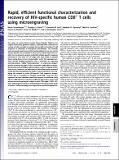Rapid, efficient functional characterization and recovery of HIV-specific human CD8+ T cells using microengraving
Author(s)
Varadarajan, Navin; Kwon, Douglas; Law, Kenneth M.; Ogunniyi, Adebola Oluwakayode; Anahtar, Melis N.; Richter, James M.; Walker, Bruce D.; Love, John C; ... Show more Show less
DownloadVaradarajan-2012-Rapid, efficient fun.pdf (643.1Kb)
PUBLISHER_POLICY
Publisher Policy
Article is made available in accordance with the publisher's policy and may be subject to US copyright law. Please refer to the publisher's site for terms of use.
Terms of use
Metadata
Show full item recordAbstract
The nature of certain clinical samples (tissue biopsies, fluids) or the subjects themselves (pediatric subjects, neonates) often constrain the number of cells available to evaluate the breadth of functional T-cell responses to infections or therapeutic interventions. The methods most commonly used to assess this functional diversity ex vivo and to recover specific cells to expand in vitro usually require more than 10[superscript 6] cells. Here we present a process to identify antigen-specific responses efficiently ex vivo from 10[superscript 4]–10[superscript 5] single cells from blood or mucosal tissues using dense arrays of subnanoliter wells. The approach combines on-chip imaging cytometry with a technique for capturing secreted proteins—called “microengraving”—to enumerate antigen-specific responses by single T cells in a manner comparable to conventional assays such as ELISpot and intracellular cytokine staining. Unlike those assays, however, the individual cells identified can be recovered readily by micromanipulation for further characterization in vitro. Applying this method to assess HIV-specific T-cell responses demonstrates that it is possible to establish clonal CD8[superscript +] T-cell lines that represent the most abundant specificities present in circulation using 100- to 1,000-fold fewer cells than traditional approaches require and without extensive genotypic analysis a priori. This rapid (<24 h), efficient, and inexpensive process should improve the comparative study of human T-cell immunology across ages and anatomic compartments.
Date issued
2012-03Department
Massachusetts Institute of Technology. Department of Chemical Engineering; Koch Institute for Integrative Cancer Research at MITJournal
Proceedings of the National Academy of Sciences
Publisher
National Academy of Sciences
Citation
Varadarajan, N. et al. “Rapid, Efficient Functional Characterization and Recovery of HIV-specific Human CD8+ T Cells Using Microengraving.” Proceedings of the National Academy of Sciences 109.10 (2012): 3885–3890. ©2012 by the National Academy of Sciences
Version: Final published version
ISSN
0027-8424
1091-6490